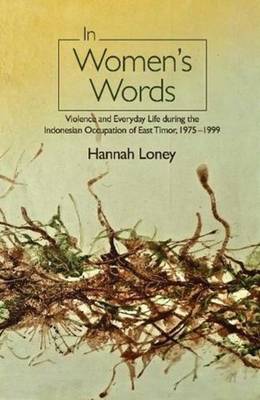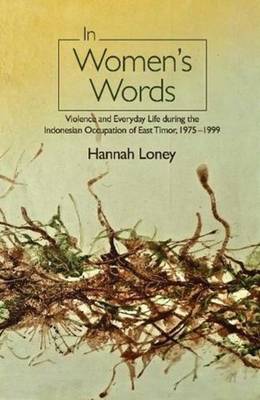
- Retrait gratuit dans votre magasin Club
- 7.000.000 titres dans notre catalogue
- Payer en toute sécurité
- Toujours un magasin près de chez vous
- Retrait gratuit dans votre magasin Club
- 7.000.0000 titres dans notre catalogue
- Payer en toute sécurité
- Toujours un magasin près de chez vous
In Women's Words
Violence and Everyday Life During the Indonesian Occupation of East Timor, 1975-1999
Hannah Loney
34,95 €
+ 69 points
Format
Description
Drawing primarily upon oral history interviews, this study presents a woman-centred history of the Indonesian occupation. It reveals the pervasiveness of violence as well as its gendered and gendering dynamics within the social and cultural everyday of life in occupied East Timor. The violence experienced by East Timorese women ranged from torture, rape, and interrogation, to various forms of surveillance and social control, and the structural imposition of particular feminine ideals upon their lives and bodies. Through women, East Timorese familial culture was also targeted via programmes to develop and modernise the territory by transforming the feminine and the domestic sphere. Women experienced the occupation differently to men, not just because they were vulnerable to sexual violence, but also because they endured proxy violence as the militarys means of targeting male relatives and the resistance at large. In Womens Words tells a story of survival and perseverance by highlighting the strength, initiative, and negotiating skills of East Timorese women. Many women lived in circumstances of constant negotiation and attempts to maintain order and normality, as well as to provide for themselves and their families, in a society where everyday life was characterised by violence and uncertainty. This study demonstrates the capacity of people to survive, to endure, and to resist, even amid the most difficult of circumstances. It provides insights into the social and cultural elements of territorial control, as well as the locally-grounded strategies that are often used for negotiating and resisting an occupying power.
Spécifications
Parties prenantes
- Auteur(s) :
- Editeur:
Contenu
- Nombre de pages :
- 256
- Langue:
- Anglais
- Collection :
Caractéristiques
- EAN:
- 9781845199715
- Date de parution :
- 01-01-19
- Format:
- Livre broché
- Format numérique:
- Trade paperback (VS)
- Dimensions :
- 152 mm x 226 mm
- Poids :
- 544 g

Les avis
Nous publions uniquement les avis qui respectent les conditions requises. Consultez nos conditions pour les avis.






